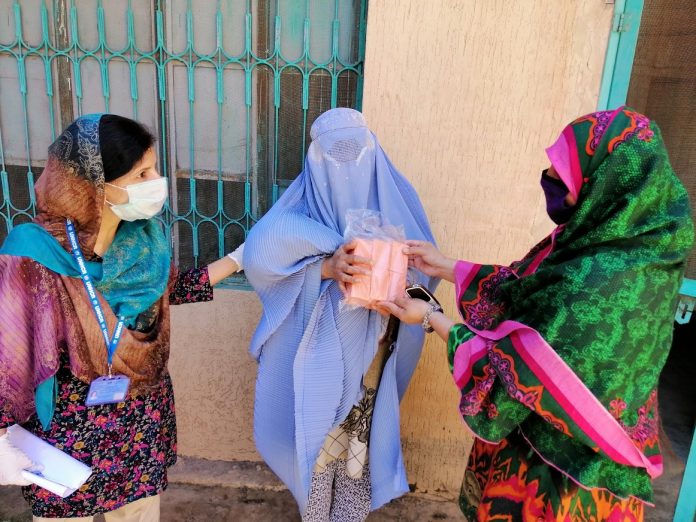ADNAN YOUSAF
ISLAMABAD, 24 April 2020 – At the onset of the COVID-19 pandemic in Pakistan, UNHCR, the UN Refugee Agency rapidly adjusted its country programme and undertook immediate actions to respond to the COVID-19 emergency.
“We remain deeply concerned by the pandemic and the impact that it’s having on the lives of refugees in Pakistan and the communities that host them. During this past month, all of us at UNHCR have been going the extra mile – with a singular mindset – to stay, deliver and support the most needy in an already vulnerable community,” said the UNHCR Deputy Representative, Mr. Iain Hall.
UNHCR’s robust field presence in locations such as Peshawar and Quetta, as well as Dalbandin, Haripur, Kohat and Loralai, is crucial to communicating and providing direct assistance to refugee communities. Through direct outreach, UNHCR also has teams that cover Punjab, Sindh and Pakistan-Administered Kashmir.
“We’re doing everything it takes to provide life-saving assistance to those most in need. I’m deeply grateful to all of our thousands of volunteers and community mobilizers who help keep us close with the large refugee population in Pakistan,” said Mr. Hall.
He added that UNHCR’s long-standing relationship with the Ministry of SAFRON/Commissionerate for Afghan Refugees and many experienced NGOs are equally important. “All have gone above and beyond to serve others at this difficult time,” noted Mr. Hall.
With the support of UNHCR, refugee community structures, such shuras and women and welfare committees in the 54 refugee villages and urban communities in Pakistan, help deliver important health advisories and social messages concerning the pandemic. Digital platforms are used to quickly disseminate information and interact with refugees, including to refer them to medical services. UNHCR also has helplines available 24 hours, 7 days a week.
The UN Refugee Agency continues to help the Government deliver its COVID-19 prevention, preparedness and response plan. Previously, UNHCR provided 10 fully equipped ambulances and 28 housing unit facilities to the provincial Health Departments and the Provincial Disaster Management Authorities in Balochistan and Khyber Pakhtunkhwa. Large Rubb hall warehousing units were also given to the Balochistan Government to support isolation facilities.
Additionally, UNHCR has distributed medical supplies, personal protective equipment (PPEs) and sanitation products, such as sanitary clothes, soap and disinfectants, and other relief items to rural health facilities. Last week, hygiene kits were distributed to thousands of vulnerable refugee families.
UNHCR is also working to identify solutions to the logistical challenges that it has encountered as a result of supply disruptions. This includes stepping up local and regional procurement activities to purchase large quantities of PPEs.
UNHCR, together with the Ministry of SAFRON/Commissionerate for Afghan Refugees and NGO partners, are in the process of upgrading water and sanitation facilities in the health centres and schools in refugee villages across the country.

















